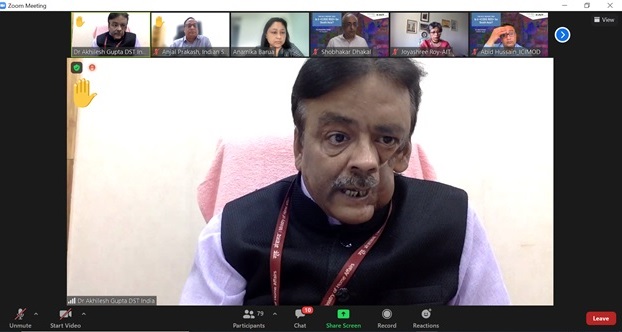Climate & policy experts discussed the seriousness of climate impact on South Asia & adaptation and mitigation steps need for it
 KRC TIMES Desk
KRC TIMES Desk

Climate and policy experts discussed the seriousness of climate impact on South Asia as highlighted in the IPCC report, and the adaptation and mitigation steps that need to be taken under the current scenario along with necessities for climate finance, net-zero emission, sustainable lifestyle at a panel discussion titled ‘The IPCC Report 2022: Is it Code Red for South Asia?’.
Dr Akhilesh Gupta, Senior Adviser, Department of Science and Technology, Govt of India, reiterated India’s commitment towards serious mitigation and adaptation measures to achieve net-zero by 2070 while maintaining the human development index.
Dr Gupta highlighted the DST’s efforts to understand the quantum of present and future f impacts of climate change through studies like the district level vulnerability assessment as well as disaster risk assessment. “The assessment will help in initiating appropriate climate actions. It will also benefit climate-vulnerable communities across India through the development of better-designed climate change adaptation projects,” he pointed out at the online webinar.

“We need to work together to meet those challenges whether at the local level or global level with our collective wisdom,” he added and underlined that climate funding by developed countries to developing and underdeveloped countries is not up to the mark.
The panel discussion on the recently released sixth assessment report was organized by the AIT School of Environment, Resource, and Development (SERD) and moderated by Dr Anamika Barua, Visiting Faculty, SERD, AIT and attended by several students from different parts of South Asia.

Dr Eden Woon, President, Asian Institute of Technology (AIT), Bangkok, said that climate change is changing quicker than expected and indicated the need for a proper road map and immediate action. “As climate change is a serious issue, which has an impact on every element of the earth, the role of policymakers is crucial, and the formulation of action should range from the local level to global level,” he added.
“The IPCC report shows that there is a need for a paradigm shift of climate mitigation by putting people at the centre and aiming towards sustainable development,” said Prof Joyshree Roy, Bangabandhu Chair Professor at AIT, Bangkok and Coordinating lead author of the WGIII report of the IPCC Sixth Assessment cycle while speaking about mitigation options to be adapted in various development activities to reduce the emission.
Mr Saad Hayat Tamman, Prime Minister’s Office, Pakistan, highlighted the need for regional-level adaptation and mitigation efforts and said that South Asia needs capital finance to tackle the problem.
Mr. Sanjay Bhowmik, MoEF, Bangladesh, elaborated on Bangladesh’s climate strategy plan, which prioritises local adaptation to address climate change, while Dr. Fida Mallik, CEGIS, Bangladesh, highlighted issues like sea-level rise, city heat, and urban burden in Bangladesh and the urgency for putting science into action.
Dr Abid Hussain, ICIMOD, Nepal, stressed the vulnerability of the mountains, the increasing impacts like loss of glaciers, change in timing of seasons as well as socio-economic changes. Dr. Arun Prakash Bhatta, Under Secretary, MoFE, Nepal, emphasized the need for immediate implementation of the National Framework on Local Adaptation Plans for Action (LAPA) through the participation of the people.
“The impact on South Asia is serious. This will impact both urban and rural areas and their livelihood. Cities in particular also have an impact on climate, and hence cities need to come up with action plan and act with urgency,” Dr. Anjal Prakash, Indian School of Business (ISB), Hyderabad and coordinating lead author for the IPCC special report on the ocean and cryosphere in a changing climate (SROCC) pointed out.
The sixth assessment report highlights that increased heatwaves, droughts, and floods are already exceeding plants’ and animals’ tolerance thresholds, driving mass mortalities in species such as trees and corals. These weather extremes are occurring simultaneously, causing cascading impacts that are increasingly difficult to manage. They have exposed millions of people to acute food and water insecurity, especially in Africa, Asia, Central, and South America, on Small Islands, and in the Arctic.
To avoid mounting loss of life, biodiversity, and infrastructure, ambitious, accelerated action is required to adapt to climate change, at the same time as making rapid, deep cuts in greenhouse gas emissions. So far, progress on adaptation is uneven, and there are increasing gaps between action taken and what is needed to deal with the increasing risks, the new report stressed.
Advertisements | 5E For Success






